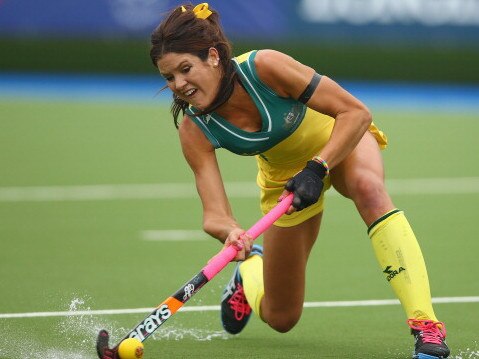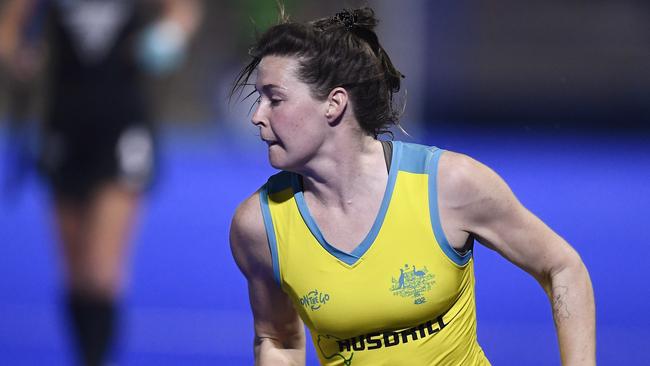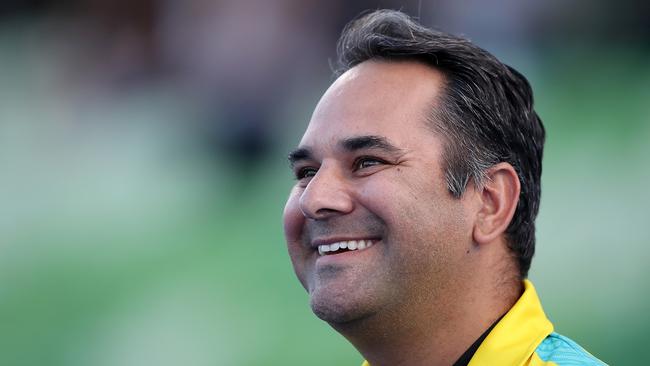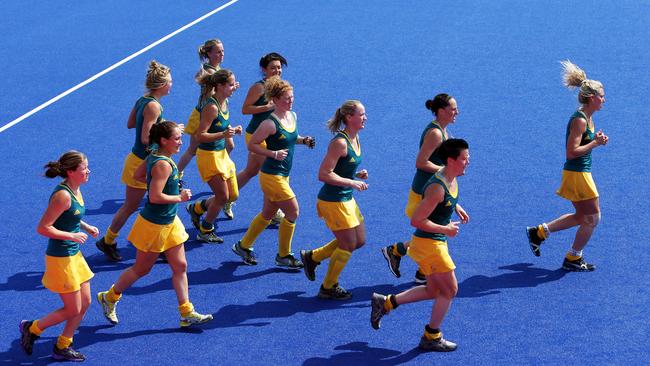Tokyo Olympics: Hockeyroos say findings from independent review panel don’t go far enough
The brave hockey stars who came forward about the sport’s toxic culture have demanded an apology after a review highlighted the alleged abuse they suffered.

Women's sport
Don't miss out on the headlines from Women's sport. Followed categories will be added to My News.
The brave women who went public with shocking accounts of their personal experiences under Hockey Australia’s elite program have demanded the sport’s leaders apologise to them following the release of a damning review into the sport’s toxic culture.
While feeling vindicated after Hockey Australia’s leaders conceded they failed to deliver on their past promises to clean up the elite women’s program, some past players say the findings from the independent review panel don’t go far enough.
The review includes 29 recommendations, mostly dealing with governance and procedural matters, which Hockey Australia says it will comply with.

But the proposals do not include an apology to the dozens of past and present players and staff who came forward to complain, some of whom went public with deeply personal stories to draw attention to the problems.
One of those was Lily Brazel, a star midfielder who has taken legal action against the national federation, claiming she was kicked off the high-performance program because she asked for time off to deal with her mental health concerns and senior staff didn’t believe her cry for help was real.
She told News Corp that while she welcomed Hockey Australia’s pledge that it will repair things for the next generation of players, board members also needed to fix any unresolved problems.
“There’s still a lot of healing that needs to be done for past players like myself, because we‘ve been through a lot,” Brazel said.
“It’s great they’re going to look into things for the future, but they can’t walk away from what’s happened.
“There’s still a lot of players, not just me, who have been left damaged and are still trying to heal from being in that toxic environment.”
Anna Flanagan, another former star player who lodged numerous complaints about the way she was treated, also wants the board to be held accountable for what happened in the past.
“There’s nothing groundbreaking about any of the recommendations,” Flanagan said.

“The board has known about the problems for years but they didn’t do anything about them until it all came out in the media.
“Now they’re promising to change things, but it’s still the same board that sat back and did nothing while all these players went through so much pain and angst.”
Several senior staff have already quit Hockey Australia, including the head coach, Paul Gaudoin, and high performance director Toni Cumpston.
Chief executive Matt Favier has not ruled out the possibility of more departures, and promised the board will act on all the recommendations.
“We’ve got a bit of work to do to think about how we can provide an environment that is safe and that is respectful,” he said.
“But at the same time still seeks to provide that international aspiration of podium success.”
With just over four months to go before the start of the postponed Tokyo Olympics, the Hockeyroos are now in a race against time to be ready to contend for the medals, with an appeal over the selection of the squad already pending.
Katie Allen has been promoted from assistant to interim head coach but the search is already underway for a new head coach.

All of the recent head coaches of the Hockeyroos have been men but that all could change soon, with double Olympic gold medallist Katrina Powell understood to be among the top candidates.
A key member of the last Australian women’s team to win Olympic gold, at Sydney in 2000, Powell’s previous job as head coach of NSW has just been advertised, leading to speculation she is on the move to a new job.
“I think she’d been an amazing fit. She’s been there and done it as a player and is greatly respected by everyone,” Flanagan said.
“She’s been an assistant coach before so the question is whether she’s interested but one thing for sure is that it’s time a woman got the job.”
Why hockey is just the tip of the iceberg
The scathing report into the running of Hockey Australia’s national high-performance program should be the game changer women’s sport in this country has been waiting generations for.
How fitting it was that it arrived in the same week thousands of protesters descended on Parliament House with the message ‘enough is enough’.
For far too long, the cries for help from Australian female athletes have been ignored or not properly acted on.
Finally, female athletes in Australia are being listened to and their harrowing stories believed.

But let there be no mistake about the deeper impact of this review, because this wasn’t just a slap on the wrist for hockey administrators.
This was an unmistakeable reminder to all sporting bodies in Australia to get their houses in order.
And the message, coming straight out of Canberra, could not be clearer: if public-funded sports don’t clean up their act themselves, higher authorities will step in and do the job for them.
That’s what Hockey Australia found out the hard way, but it could just as easily have been any number of Australian sporting bodies that still haven’t figured out why investigations into serious integrity issues – including abuse, intimidation and bullying – need to be handed over to independent panels.
As damaging as it seems right now, Hockey Australia deserves credit for agreeing to being the first sport in the country to do that, but rest assured they won’t be the last.
The push to independently investigate integrity issues has been led by the Australian Olympic Committee in the wake of the global gymnastics abuse scandal and the tragic death of the Russian-born Australian figure skater Katia Alexandrovskaya.
The federal government has strongly backed the proposal, empowering Sport Integrity Australia to lead the crackdown on sporting bodies accused of sweeping things under the carpet.
The government even chipped in $10 million to investigate serious complaints, plus an additional $3.6 million for the National Sports Tribunal to resolve disputes through mediation, arbitration and conciliation.
The Hockey Australia investigation is proof the new system works.
More than 100 people came forward to testify, and the sport’s officials have accepted ownership of the review findings and agreed that the elite women’s program needs a complete overhaul.
Hockey Australia has promised to comply with all of the recommendations from the review, with changes already in motion, but they will be watched closely.
For the dozens of women who contacted News Corp to tell their stories about how they were body-shamed, bullied and harassed, the report has importantly brought some sense of vindication.
As one former player said, “everything we said was always the truth. It’s a shame it’s taken this long for them to believe us.”
But the breakthrough needs to be the start, not the end, because too many sports still haven’t got the memo when it comes to investigating abuse.
The next major battleground is already approaching.
Some of Australia’s biggest sporting bodies – which are heavily funded by taxpayers – have still not signed up for the National Redress Scheme, which provides support to victims of institutional sexual abuse.
They have now been put on notice.


